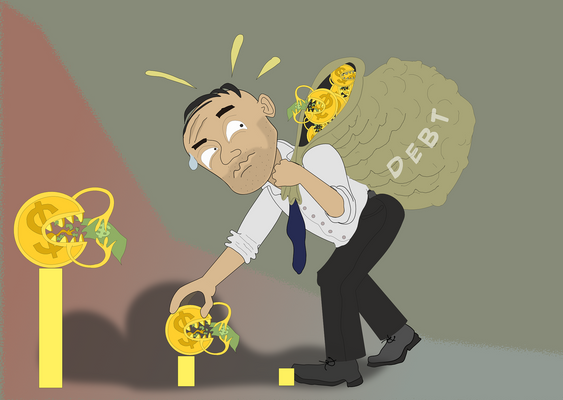5.1.4
Demergers
Reasons for Demergers
Reasons for Demergers
A demerger is the reversal of a merger between two firms or the reversal of a takeover. One large firm is broken into two or more smaller firms. This can happen because of:


Diseconomies of scale
Diseconomies of scale
- If the firm is too large and is experiencing diseconomies of scale then a firm may decide that a demerger is better for shareholders.


Antitrust
Antitrust
- Like how governments block some takeovers, a firm may demerge because of government intervention.
- If a government views a monopoly market structure as a market failure, then the government may force the firm to be broken up.
- Standard Oil was split up by the US Supreme Court into multiple smaller oil companies in 1911.


Failed merger
Failed merger
- If firms merged hoping to cross-sell extra products to customers and this failed then they may demerge.
- If firms merged to try to cut costs by sharing some costs, but this failed, then they may demerge.


Underperforming business unit
Underperforming business unit
- If only one part of the business area is underperforming then it may make sense to demerge that part of the business so that management can focus more on the more successful business areas or units.
- Equity markets may increase the 'multiple' that investors will pay for a business if it only contains 1 successful business instead of 1 successful business and 3 underperforming businesses. Therefore a demerger could create shareholder value.
- Philips sold off their Philips Lighting business via an IPO to focus on higher margin businesses.


Investment or debt
Investment or debt
- A firm may sell off one of its divisions to pay off business debts or to undertake a major investment programme.
- Hewlett Packard separated their software and hardware businesses in 2017.
The Impact of Demergers
The Impact of Demergers
Demergers can have different impacts on businesses, workers and consumers.


Impact on businesses
Impact on businesses
- A business is likely to have a better focus after a demerger.
- The total equity value of the business units may rise after a de-merger. If the businesses were unrelated, then a 'conglomerate discount' may vanish.
- If a business was suffering from diseconomies of scale, then a demerger may increase efficiency and lower average cost. However, if the business was operating at the minimum efficient scale, then a lower output may increase average cost.
- Selling a loss-making business is difficult. People are more likely to want to buy a successful business. 'Realising a loss' on a past acquisition and accepting it was a bad choice may harm management's power in the business.


Impact on workers
Impact on workers
- Some workers may be forced to work for a new legal entity or employer. There may be cultural clashes or a fall in morale.
- If the demerger happens to fund investment, then some of this investment may be in machinery or automation tools that reduce the need for labour.
- Operating in a smaller firm may be good for workers. Dunbar's number finds that people can operate in groups of up to 150 whilst maintaining strong social relations with all of the other members of the group.


Impact on consumers
Impact on consumers
- If demerging stops a firm suffering from diseconomies of scale, efficiency could rise, costs could fall and prices could also fall, increasing the level of consumer surplus.
- But if the firm loses economies of scale, costs could rise and prices could rise. This is likely to reduce consumer surplus and consumer welfare.
- But having more firms in an industry may increase choice and competition, leading to higher quality products/services and lower prices.
1Introduction to Markets
1.1Nature of Economics
1.1.1Economics as a Social Science
1.1.2Positive & Normative Economic Statements
1.1.3The Economic Problem
1.1.4Resources
1.1.5Production Possibility Frontiers
1.1.6Specialisation & Division of Labour
1.1.7Types of Economies
1.1.8End of Topic Test - Nature of Economics
1.1.9Application Questions - Nature of Economics
1.2How Markets Work
1.2.1Rational Decision Making
1.2.2Demand
1.2.3Elasticities of Demand
1.2.4Elasticities of Demand 2
1.2.5Elasticity & Revenue
1.2.6Supply
1.2.7Elasticity of Supply
1.2.8Price Determination
1.2.9Price Mechanism
1.2.10Consumer & Producer Surplus
1.2.11Indirect Taxes & Subsidies
1.2.12A-A* (AO3/4) - Taxing Prices or Quantities?
1.2.13Alternative View of Consumer Behaviour
1.2.14End of Topic Test - Markets
1.2.15A-A* (AO3/4) - Markets
2Market Failure
2.1Market Failure
2.2Government Intervention
2.2.1Government Intervention in Markets
2.2.2Subsidies & Price Controls
2.2.3Pollution Permits & Regulation
2.2.4A-A* (AO3/4) - European Emissions Trading
2.2.5State Provision & Information Provision
2.2.6Government Failure
2.2.7End of Topic Test - Government Intervention
2.2.8A-A* (AO3/4) - Government Intervention
3The UK Macroeconomy
3.1Measures of Economic Performance
3.1.1Measuring Economic Growth
3.1.2National Income Data
3.1.3Inflation
3.1.4Causes of Inflation
3.1.5Consequences of Inflation
3.1.6Employment & Unemployment
3.1.7Causes & Impact of Unemployment
3.1.8A-A* (AO3/4) - Hysteresis
3.1.9Balance of Payments
3.1.10Current Account Deficit & Imbalances
3.1.11End of Topic Test - Economic Performance
3.1.12Application Questions Macroeconomy
3.2Aggregate Demand
3.3Aggregate Supply
3.4National Income
4The UK Economy - Policies
4.1Macroeconomic Objectives & Policies
4.1.1Possible Objectives
4.1.2Demand-Side Policies - Monetary
4.1.3Demand-Side Policies - Monetary 2
4.1.4A-A* (AO3/4) - The Future of Interest Rates
4.1.5Demand-Side Policies - Fiscal
4.1.6Demand-Side Policies in 2007-08
4.1.7Strengths & Weaknesses of Demand Side
4.1.8Supply-Side Policies
4.1.9Supply-Side Policies 2
4.1.10Conflicts Between Objectives
4.1.11A-A* (AO3/4) - Conflicting Incentives
4.1.12Phillips Curve
4.1.13End of Topic Topic - Policies & Objectives
4.1.14Application Questions - UK Policies
5Business Behaviour
5.1Business Growth
5.2Business Objectives
6Market Structures
6.1Market Structures
6.1.1Efficiency
6.1.2Perfect Competition
6.1.3Perfect Competition 2
6.1.4Monopolistic Competition
6.1.5Oligopolies
6.1.6The Prisoner's Dilemma
6.1.7Collusion in Oligopolistic Markets
6.1.8A-A* (AO3/4) - Which Factors Affect Collusion?
6.1.9Monopolies
6.1.10Price Discrimination
6.1.11Monopsony
6.1.12A-A* (AO3/4) - Models in Economics
6.1.13Contestability
6.1.14Benefits of Contestability
6.1.15End of Topic Test - Market Structures
6.1.16Application Questions - Market Structures
6.1.17A-A* (AO3/4) - Cereal Collusion
6.2Labour Market
6.2.1Demand for Labour
6.2.2Supply of Labour
6.2.3Labour Market Imperfections
6.2.4A-A* (AO3/4) - Labour Productivity & Unemployment
6.2.5A-A* (AO3/4) - What Level of Unionisation is Good?
6.2.6Wage Determination
6.2.7Elasticity of Labour Supply & Demand
6.2.8Intervention in Setting Wages
6.2.9End of Topic Test - Labour Market
6.2.10A-A* (AO3/4) - Labour Markets
6.3Government Intervention
6.3.1Reasons for Government Intervention
6.3.2Government Promotion of Competition
6.3.3Usefulness of Competition Policy & Examples
6.3.4A-A* (AO3/4) - Modern Competition Policy
6.3.5Privatisation
6.3.6Government Regulation
6.3.7A-A* (AO3/4) - Nationalisation vs Privatisation
6.3.8Government Protection of Suppliers and Employees
6.3.9Impact of Government Intervention
6.3.10End of Topic Test - Government Intervention
6.3.11Application Questions - Government Intervention
7A Global Perspective
7.1International Economics - Globalisation & Trade
7.2International Economics - Currency
7.2.1Merged Currency
7.2.2Restrictions on Free Trade
7.2.3Arguments for Protectionism
7.2.4Arguments Against Protectionism
7.2.5Balance of Payments
7.2.6Balance of Payments 2
7.2.7Floating Exchange Rates
7.2.8Fixed Exchange Rate
7.2.9International Competitiveness
7.2.10End of Topic Test - International Economy
7.2.11Application Questions - International Economics
8Finance & Inequality
8.1Poverty & Inequality
8.2Emerging & Developing Economies
8.2.1Measures of Development
8.2.2Factors Influencing Growth & Development
8.2.3Barriers to Development
8.2.4Barriers to Development 2
8.2.5A-A* (AO3/4) - The Bottom Billion
8.2.6Development Strategies
8.2.7Interventionist Strategies
8.2.8Aid
8.2.9International Institutions
8.2.10International Institutions 2
8.2.11End of Topic Test - Emerging & Developing
8.2.12Application Questions - Developing Countries
8.3The Financial Sector
8.4Role of the State in the Macroeconomy
9Examples of Global Policy
9.1International Policies
Jump to other topics
1Introduction to Markets
1.1Nature of Economics
1.1.1Economics as a Social Science
1.1.2Positive & Normative Economic Statements
1.1.3The Economic Problem
1.1.4Resources
1.1.5Production Possibility Frontiers
1.1.6Specialisation & Division of Labour
1.1.7Types of Economies
1.1.8End of Topic Test - Nature of Economics
1.1.9Application Questions - Nature of Economics
1.2How Markets Work
1.2.1Rational Decision Making
1.2.2Demand
1.2.3Elasticities of Demand
1.2.4Elasticities of Demand 2
1.2.5Elasticity & Revenue
1.2.6Supply
1.2.7Elasticity of Supply
1.2.8Price Determination
1.2.9Price Mechanism
1.2.10Consumer & Producer Surplus
1.2.11Indirect Taxes & Subsidies
1.2.12A-A* (AO3/4) - Taxing Prices or Quantities?
1.2.13Alternative View of Consumer Behaviour
1.2.14End of Topic Test - Markets
1.2.15A-A* (AO3/4) - Markets
2Market Failure
2.1Market Failure
2.2Government Intervention
2.2.1Government Intervention in Markets
2.2.2Subsidies & Price Controls
2.2.3Pollution Permits & Regulation
2.2.4A-A* (AO3/4) - European Emissions Trading
2.2.5State Provision & Information Provision
2.2.6Government Failure
2.2.7End of Topic Test - Government Intervention
2.2.8A-A* (AO3/4) - Government Intervention
3The UK Macroeconomy
3.1Measures of Economic Performance
3.1.1Measuring Economic Growth
3.1.2National Income Data
3.1.3Inflation
3.1.4Causes of Inflation
3.1.5Consequences of Inflation
3.1.6Employment & Unemployment
3.1.7Causes & Impact of Unemployment
3.1.8A-A* (AO3/4) - Hysteresis
3.1.9Balance of Payments
3.1.10Current Account Deficit & Imbalances
3.1.11End of Topic Test - Economic Performance
3.1.12Application Questions Macroeconomy
3.2Aggregate Demand
3.3Aggregate Supply
3.4National Income
4The UK Economy - Policies
4.1Macroeconomic Objectives & Policies
4.1.1Possible Objectives
4.1.2Demand-Side Policies - Monetary
4.1.3Demand-Side Policies - Monetary 2
4.1.4A-A* (AO3/4) - The Future of Interest Rates
4.1.5Demand-Side Policies - Fiscal
4.1.6Demand-Side Policies in 2007-08
4.1.7Strengths & Weaknesses of Demand Side
4.1.8Supply-Side Policies
4.1.9Supply-Side Policies 2
4.1.10Conflicts Between Objectives
4.1.11A-A* (AO3/4) - Conflicting Incentives
4.1.12Phillips Curve
4.1.13End of Topic Topic - Policies & Objectives
4.1.14Application Questions - UK Policies
5Business Behaviour
5.1Business Growth
5.2Business Objectives
6Market Structures
6.1Market Structures
6.1.1Efficiency
6.1.2Perfect Competition
6.1.3Perfect Competition 2
6.1.4Monopolistic Competition
6.1.5Oligopolies
6.1.6The Prisoner's Dilemma
6.1.7Collusion in Oligopolistic Markets
6.1.8A-A* (AO3/4) - Which Factors Affect Collusion?
6.1.9Monopolies
6.1.10Price Discrimination
6.1.11Monopsony
6.1.12A-A* (AO3/4) - Models in Economics
6.1.13Contestability
6.1.14Benefits of Contestability
6.1.15End of Topic Test - Market Structures
6.1.16Application Questions - Market Structures
6.1.17A-A* (AO3/4) - Cereal Collusion
6.2Labour Market
6.2.1Demand for Labour
6.2.2Supply of Labour
6.2.3Labour Market Imperfections
6.2.4A-A* (AO3/4) - Labour Productivity & Unemployment
6.2.5A-A* (AO3/4) - What Level of Unionisation is Good?
6.2.6Wage Determination
6.2.7Elasticity of Labour Supply & Demand
6.2.8Intervention in Setting Wages
6.2.9End of Topic Test - Labour Market
6.2.10A-A* (AO3/4) - Labour Markets
6.3Government Intervention
6.3.1Reasons for Government Intervention
6.3.2Government Promotion of Competition
6.3.3Usefulness of Competition Policy & Examples
6.3.4A-A* (AO3/4) - Modern Competition Policy
6.3.5Privatisation
6.3.6Government Regulation
6.3.7A-A* (AO3/4) - Nationalisation vs Privatisation
6.3.8Government Protection of Suppliers and Employees
6.3.9Impact of Government Intervention
6.3.10End of Topic Test - Government Intervention
6.3.11Application Questions - Government Intervention
7A Global Perspective
7.1International Economics - Globalisation & Trade
7.2International Economics - Currency
7.2.1Merged Currency
7.2.2Restrictions on Free Trade
7.2.3Arguments for Protectionism
7.2.4Arguments Against Protectionism
7.2.5Balance of Payments
7.2.6Balance of Payments 2
7.2.7Floating Exchange Rates
7.2.8Fixed Exchange Rate
7.2.9International Competitiveness
7.2.10End of Topic Test - International Economy
7.2.11Application Questions - International Economics
8Finance & Inequality
8.1Poverty & Inequality
8.2Emerging & Developing Economies
8.2.1Measures of Development
8.2.2Factors Influencing Growth & Development
8.2.3Barriers to Development
8.2.4Barriers to Development 2
8.2.5A-A* (AO3/4) - The Bottom Billion
8.2.6Development Strategies
8.2.7Interventionist Strategies
8.2.8Aid
8.2.9International Institutions
8.2.10International Institutions 2
8.2.11End of Topic Test - Emerging & Developing
8.2.12Application Questions - Developing Countries
8.3The Financial Sector
8.4Role of the State in the Macroeconomy
9Examples of Global Policy
9.1International Policies
Unlock your full potential with Seneca Premium
Unlimited access to 10,000+ open-ended exam questions
Mini-mock exams based on your study history
Unlock 800+ premium courses & e-books